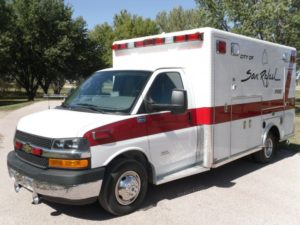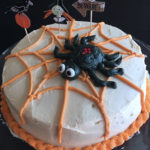 Use the Epi-Pen and call 911 — that is the title of my post. That is what you are supposed to do when your child has an anaphylactic reaction caused by a food allergy. This is what I did 1 week ago.
Use the Epi-Pen and call 911 — that is the title of my post. That is what you are supposed to do when your child has an anaphylactic reaction caused by a food allergy. This is what I did 1 week ago.
My almost-13-year-old was hungry and she asked me to make her some food. I decided to make a new pasta that has pea protein in it. There are a lot of gluten-free products with pea protein added as it provides texture that gluten-free products lack. My daughter had avoided pea protein in the past because she suspected that it didn’t make her feel good, but it had been years and we both shrugged it off. She is allergic to peanuts and lentils, and chickpeas make her throat itch (bad sign — needs to get tested for that too). These are all legumes and so are peas, though she ate peas as a child, and she eats pinto beans and black beans with no problem.
That particular day, she ate the pasta with pea protein. After she finished her pasta, she went upstairs to her bedroom, and within 5 minutes, she began to wheeze. I asked her if she was okay. She was trying to be okay, but I could tell that she was having trouble breathing. She took a Benadryl. Then a single hive appeared on her chin, and she began clearing her throat. I knew from an egg challenge she did in the doctor’s office 7 years earlier, that once the throat was affected, it was serious. She still felt pressure in her chest, and the throat clearing was getting worse.
I asked her if she wanted the Epi-Pen. She said yes. “Should I do it myself?” she asked. “I can do it,” I replied. I had actually never given her an Epi-Pen before. The only time she had required the shot outside of the doctor’s office was three years ago but my dad did it (you can read about that experience here). So, there we were — I gave her the shot in her thigh, and held it for 10 seconds as the instructions state.
I waited for her to get better. I expected her to get better. We would go to the hospital, as you are supposed to do after you give the Epi-Pen, but I thought that we were being over-reactive. We were just following the rules, being on the safe side. We got in the car for the approximately 12-minute drive to the hospital, and I realized that I was stressed when I discovered that I forgot to grab my phone on the way out the door. Oh well, we wouldn’t need it, I thought.
Part way through the drive, I looked at my unusually-quiet daughter and asked her if she was ok. She had taken on a very pale-green color in her face. She didn’t want to talk. I suddenly remembered stories about kids in anaphylactic shock who had fallen unconscious in the car on the way to the hospital, and died. “Do you want me to pull the car over and call 911?” I asked her. “Yes,” she replied. We called from her phone since I didn’t have mine (thank goodness this time for phone-addicted teenagers!).
A fire engine and ambulance appeared on the side of the road where I had pulled over. They examined her while she sat in the passenger seat. “You did the right thing,” they said, about giving her the Epi-Pen. And then, one of the men said to me, “I’m so glad you called. Please don’t hesitate to call 911 in the future because with food allergies, when it goes south, it goes south quickly.”
They took her in the ambulance, with me following in my car. They told me that they felt she would be fine but that they would monitor her along the way. They did not turn on the sirens. We arrived at the hospital, and she emerged inhaling albuterol for the wheezing. She was admitted, given an IV of Benadryl and prednisone, and released 3.5 hours later, with instructions to take prednisone tablets for 3 days to prevent recurrence of anaphylactic shock. After 72 hours, the doctor told me, there is no chance if it recurring.
My daughter is fine. I am fine (sort of). This was a reminder to all of us that this S*%# is real.
I write this as a public service announcement to anyone dealing with food allergies. Please remember the following:
- Carry an epi-pen with you at all times. Your allergic child should carry an epi-pen everywhere he/she goes.
- Know the signs of an anaphylactic reaction — people may experience these symptoms:
Respiratory: difficulty breathing, rapid breathing, shortness of breath, or wheezing
Skin: hives, swelling under the skin, blue skin from poor circulation, or rashes
Gastrointestinal: nausea or vomiting
Whole body: fainting, lightheadedness, low blood pressure, dizziness, or flushing
Also common: fast heart rate, feeling of impending doom, itching, tongue swelling, difficulty swallowing, facial swelling, mental confusion, nasal congestion, or impaired voice - If there is a reaction, especially to a known or suspected allergen, use the epi-pen. In young, healthy people, there is very low risk of problems from the epi-pen, and the needle doesn’t really hurt (according to my daughter).
- Call 911.
And life goes on for us. Thankfully.







Kate Odette says
As a school nurse in a large high school, I usually give epinephrine autoinjectors to anywhere from 3-5 students per school year. Honestly, most of the time I am giving stock epinephrine (thanks to the stock epi law in Michigan) to students that have known food allergies but haven’t had a reaction in years and don’t take their allergies seriously and do not have a food allergy action plan in place and have not provided the school with epinephrine. Folks, your high school students are at very high risk for anaphylaxis! We have been very fortunate with our outcomes. I train our staff to always follow the student’s food allergy action plan. This means for a major reaction (more than 1 body system involved always give Epi first, call 911, then give an antihistamine and inhaler if prescribed, then call parent. I tell our staff that if it crosses your mind that a student needs the epinephrine autoinjector they should give it. It will not hurt them.
Alison says
Your school is lucky to have someone like you, Kate!
Kelly says
My son has peanut/tree nut/pea/egg allergies and carries an epipen and benadryl. Found out when he was a baby after he tried peas and broke out in hives and later eggs so went to get tested. Can I ask why you would give your daughter this food that you know she’s had reactions to in the past? This sounds like it could have been totally avoided. My allergist told me that if he eats something and he says it doesn’t taste right(bananas and strawberries make his tongue itch) not to give it to him again. You never know which time could be fatal as the symptoms usually get worse each time exposed to it.
Alison says
Kelly,
You are right – I let my guard down. But she had eaten a few bites of the same pasta earlier in the week, maybe less than I thought, with no complaints. I definitely learned my lesson.